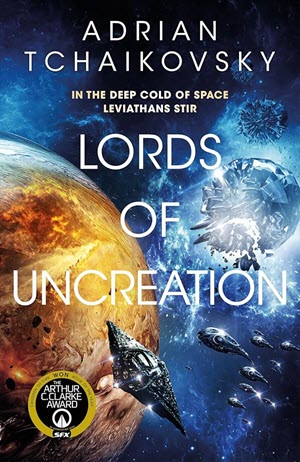Lords of Uncreation
 Reviewing the last in a trilogy of massive space opera books is a bit of a challenge. It is hard to say anything about the book to hand without giving spoilers for the previous volumes. I shall talk mostly about how Adrian Tchaikovsky has structured the book, which I think is seriously impressive.
Reviewing the last in a trilogy of massive space opera books is a bit of a challenge. It is hard to say anything about the book to hand without giving spoilers for the previous volumes. I shall talk mostly about how Adrian Tchaikovsky has structured the book, which I think is seriously impressive.
Looking back at my review of Eyes of the Void, I see that I left the story at the point where Idris Telemier, with the help of the mad Naeromathi who calls himself Ahab, has found a way to navigate Unspace, the parallel dimension through which interstellar travel takes place, and in which the monstrous Architects live. Idris, as an Intermediary, is still hoping to do his job and persuade the Architects to stop their campaign of genocide against intelligent life. Everyone else wants Idris to guide them to the Architect homeworld (such as it is, there being no ‘words’ as such in Unspace) and help them destroy it.
It is a small but important spoiler to note that Idris is aware that the Architects do not do as they do willingly. They are unwilling and sorrowful slaves of a greater power that also lives in Unspace. Hence the title of the book, Lords of Uncreation. The artistic shapes that the Architects make from the planets that they destroy are somehow an expression of their grief for the lives they have been forced to snuff out. Idris, and Idris alone, wants to save the Architects too.
In order to pull this off, Tchaikovsky has to provide an explanation as to who these Lords of Uncreation are, and why they want to destroy all intelligent life in the universe that is not them. And he has to do so without waving his hands and calling them ‘gods’. I’m pleased to say that he provides a rational explanation for them. The physics is doubtless a little hand-wavy, but it is physics. And this despite the fact that his explanation has a distinct similarity to the reason why the god Enlil decides to destroy mankind in the original Sumerian flood myth.
There is also some similarity to this:
In his house at R’lyeh dead Cthulhu waits dreaming.
Idris, however, is determined to take himself off to R’lyeh and give Cthulhu a good talking-to.
The other thing that Tchaikovsky does , and could probably have gotten away without doing, is choreography the ending so that all of the major characters in his story have a role to play. Olli and Kit in the Vulture God, Kris; the knife-fighting lawyer; Solace, the Parthenon warrior; Havaer Mundy, the secret agent; all of them have their role to play. Idris could not succeed without the skills that each of them brings to the party. Even The Presence, the monstrous shadowy being that haunts Unspace, has a key part in the denouement.
Along the way we get to learn a bit more about the mysterious and powerful aliens known as the Essiel. In particular, The Unspeakable Aklu, the Razor and the Hook, has an important role to play in the story. We also meet a second, and much less renegade Essiel called The Resplendent Utir, the Prophet and the Judge.
The Essiel are quite clearly grown-ups as far as civilisations go, albeit rather too fond of cosplay. The humans, sadly, are anything but. As I noted in my review of Eyes of the Void, this series is in part an allegory for Climate Change. The universe is beset by an implacable threat that will wipe out intelligent life, and all that the various human, and human-adjacent, factions want to do is make sure that their little group is the last group standing. They might be all going to die, but they will have killed everyone else first.
Of course some of them are convinced that they, and only they, are the Master Race subset of humanity that will survive the apocalypse and end up rulers of the universe.
It was doubtless depressing when Tchaikovsky wrote it. It is far more depressing right now when so many of the more powerful nations on Earth are doing exactly as he foretold. Nor are there any Essiel around the knock sense into us.
To summarise, Tchaikovsky set himself the challenge of writing an epic space opera trilogy with a very important message for the present day, and he executed that task quite brilliantly. With all due respect to Ann Leckie (whose work I also love), this trilogy deserved that Best Series Hugo.
The good news is that the series may become newly eligible because Tchaikovsky is writing a graphic novel prequel for Paul Cornell’s new comics company.

Title: Lords of Uncreation
By: Adrian Tchaikovsky
Publisher: Pan Macmillan
Purchase links:
Amazon UK
Amazon US
Bookshop.org UK
See here for information about buying books though Salon Futura